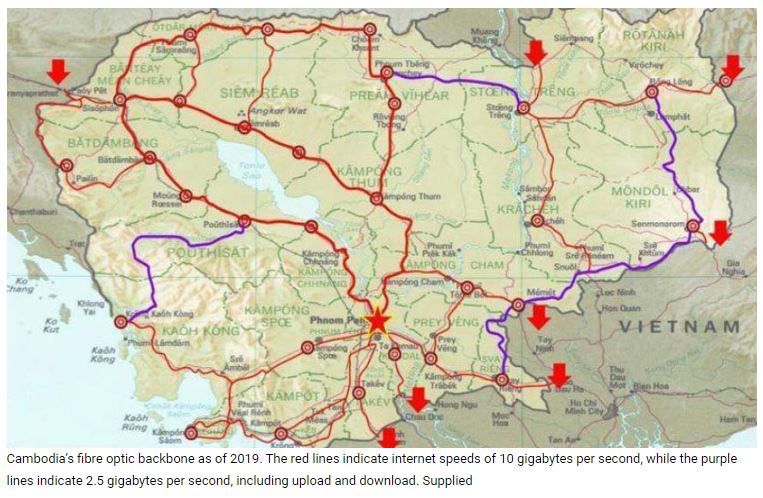Cambodia: Cost and effect of a National Internet Gateway
The operation of the National Internet Gateway (NIG) will cost Cambodia approximately $50,000 per month in personnel salaries at its four facilities, according to one expert.
The source, speaking under the condition of anonymity, said the figure provided was a rough estimate.
It was based on the belief that workers at the four facilities would be foreign-trained, highly specialised information technology professionals.
The source added that daily facility staffing would require at least two technicians each working 12-hour shifts, seven days per week. He said that based on industry norms, workers at these facilities would earn up to $2,500 per month.
The government announced last month that it would establish four NIG facilities in the Kingdom to be located in Phnom Penh, Banteay Meanchey, Preah Sihanouk and Svay Rieng provinces.
Investments will also have to be made in building construction ,flood protection, setting up servers, connecting to the energy grid, ensuring multiple back-up power options, providing adequate cooling and the setting of fibre optic cabling according to the source.
He added that the front-end costs for the project would start at around $50,000 per facility, but likely would be much more than that.
According to the source, “The project is not impossible, but extremely difficult and I am sceptical about how useful it will be.
Fear among the public that their communications will be monitored, especially through apps like iMessage and WhatsApp are however unfounded.
“Most popular chat services, except email, SMS [Short Messaging Service] and MMS [Multimedia Messaging Service] are encrypted end-to-end. Not even companies like Facebook or Apple can read those messages. They can only be accessed by the sender and recipient.”
He did, however, stress that measures could be taken to obtain people’s internet protocol (IP) and media access control [MAC] addresses on certain blog sites to identify users. IP addresses are tied to users’ internet access and MAC addresses are tied to personal devices.
The source added that certain sites hosted by Cloudflare and Amazon Web Services would likely remain operating as normal, noting that Advanced Bank of Asia hosts its entire operations on Cloudflare’s content delivery network service.
When asked whether the NIG would slow broadband access, the source said it would “undeniably bring internet speeds to a crawl.”
“The internet was not designed to be channelled through single pipelines.It relies on the free flow of information and [extends] to more than people’s computer screens. The traffic through optical cables takes the path of least resistance so information can be uploaded and downloaded quickly.”
He added that currently the Kingdom has adequate bandwidth for its internet users, but stressed that funnelling all traffic through a limited number of pipelines would ultimately hurt the user experience.
The source said that it also has the potential to hurt Cambodia’s burgeoning fintech industry, saying that the entire digital transition relies on ease of use and functionality. Should users find using e-wallets and online payment apps slow or unreliable, people will revert to using cash as their primary payment method.
“I think a lot of people who can afford it are looking to Starlink’s internet service. Satellite internet technology can disrupt the entire sector. It has low latency and may even upend the telecom industry as a whole through VoIP [voice over internet protocol],” he said.
The source added that virtual private networks (VPNs), which are used to disguise a computer online, always slow down connections. Depending on the service and which server a user is connected to, the difference can though be marginal.
Experts say using a VPN is not foolproof in protecting a user identity. NIG operators will be able to identify devices and operating systems used. Should they get access to the user’s supplier or the user has registered their device via a warranty, the device could potentially be identified.
Khmer Times reached out to the Ministry of Posts and Telcommunications on Monday for their responses to the sources’ assertions but none were received.
Source: https://www.khmertimeskh.com/50822253/cost-and-effect-of-a-national-internet-gateway/


 English
English




